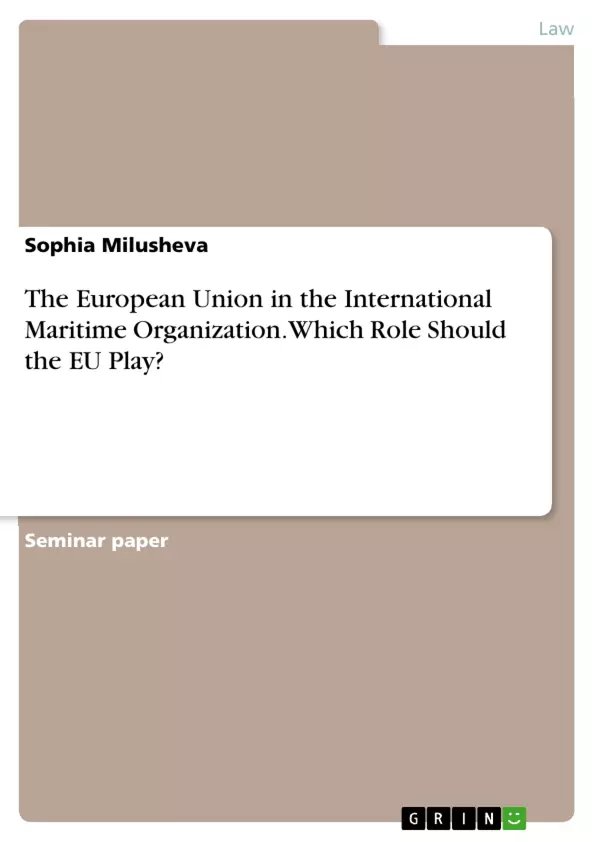It is clear to the EU that shipping is an activity of international nature that requires intensive communication between involved parties and thus cannot be managed well by a single country. Following, the increasing involvement of the EU in the IMO has to be recognized and investigated. It should be considered which role the EU should play in the IMO, and how this role and expectations thereof have evolved over the years.
To explore this, this paper firstly lays out the shipping policies of the IMO and the EU, before moving to the position that the EU holds within the IMO through its status and participation. Then, a timeline of the Commission’s attempts of obtaining a full membership is explored, explaining international and Member States’ responses. Finally, the paper explicitly addresses the legal challenges of reaching a full EU membership and elaborates on the duty of loyalty. The paper finds out that there are both advantages and disadvantages of an EU membership in the IMO through the Commission, and suggests that instead, a reinforced coordination between the EU and its Member States might be the better and more realistic solution for the EU/IMO relationship.
The European Union made out of its 27 Member States spreads over 70,000 km along fours seas and two oceans. 41% of the world’s fleet is controlled by European companies. The EU plays a crucial role in the shipping world, and is responsible for ensuring the sustainability of the marine environment in order for its sea-related companies to be competitive and thrive. Another entity that shares these responsibilities of “safe, secure and efficient shipping on clean oceans” is the UN’s International Maritime Organization, established in 1948. Albeit its significant role in international maritime decision-making, the EU is not a member of the IMO, as membership is reserved for states only. The EU possesses the most advanced and comprehensive regulatory framework for shipping worldwide – the 3rd Maritime Safety Package. However, internationally an opinion has been formed that the EU’s approach is rather regional and unilateral and could thus possibly undermine the authority of international law.
Inhaltsverzeichnis (Table of Contents)
- Introduction
- 1. The Organizations
- 1.1 The International Maritime Organization
- 1.2 The European Union and its shipping policies
- 2. The European Union within the International Maritime Organization
- 2.1 Observer status
- 2.2 Participation through EU's Member States
- 2.3 Coordination process
- 3. The European Commission's attempts to obtain a full EU membership in the IMO
- 3.1 The Green Paper for a European Maritime Policy 2006
- 3.2 The Lisbon Treaty and the Maritime Transport Strategy 2009-2018
- 3.3 The Barroso-Ashton Strategy 2012
- 3.4 Present day
- 4. Legal challenges of a full EU membership in the IMO
- 4.1 Duty of loyalty
- Conclusion
- References
Zielsetzung und Themenschwerpunkte (Objectives and Key Themes)
This paper explores the evolving relationship between the European Union (EU) and the International Maritime Organization (IMO), focusing on the EU's attempts to secure full membership in the IMO. The paper investigates the EU's role in the IMO through its observer status and participation via its Member States, analyzing the legal challenges of a full EU membership and the duty of loyalty involved.
- The EU's maritime policies and their impact on international shipping
- The EU's role and influence within the IMO through its observer status and Member State participation
- The EU's attempts to secure full membership in the IMO, including the legal challenges and the duty of loyalty
- The potential advantages and disadvantages of EU membership in the IMO
- The importance of coordination between the EU and its Member States in shaping the EU/IMO relationship
Zusammenfassung der Kapitel (Chapter Summaries)
The introduction outlines the significance of the maritime sector for the EU and introduces the IMO, highlighting the EU's non-membership status despite its crucial role in maritime decision-making. Chapter 1 provides an overview of the IMO and the EU's shipping policies, emphasizing the development of EU regulations and directives in response to maritime incidents and the need for a comprehensive regulatory framework. Chapter 2 explores the EU's current position within the IMO through its observer status and participation via its Member States, discussing the coordination process and the potential for increased involvement. Chapter 3 examines the EU's attempts to gain full membership in the IMO through various strategic documents, including the Green Paper, the Lisbon Treaty, and the Barroso-Ashton Strategy, outlining the international and Member State responses. Chapter 4 analyzes the legal challenges of EU membership, particularly regarding the duty of loyalty.
Schlüsselwörter (Keywords)
The main keywords and focus topics of this paper include: European Union, International Maritime Organization, maritime policy, shipping, IMO membership, observer status, Member State participation, duty of loyalty, legal challenges, international relations, maritime transport, sustainability, environmental protection, safety regulations, and EU-IMO relations.
- Quote paper
- Sophia Milusheva (Author), 2020, The European Union in the International Maritime Organization. Which Role Should the EU Play?, Munich, GRIN Verlag, https://www.grin.com/document/1000030



